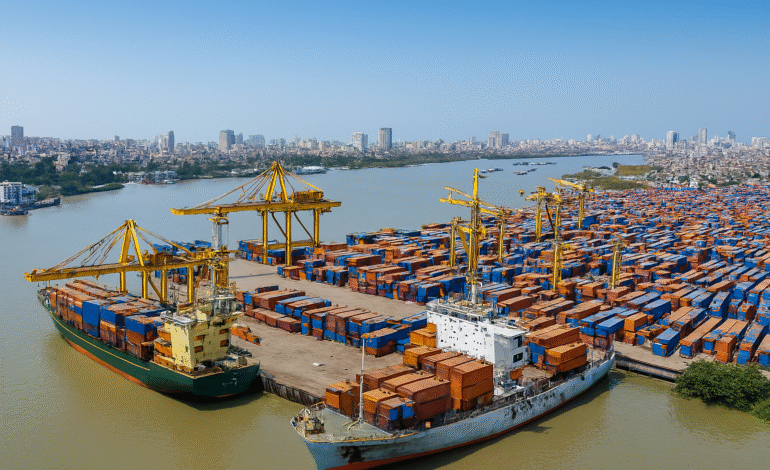Foreign Firms to Operate 3 Chittagong Port Terminals from December

Chittagong Port Terminals to be Handed over for 30 years
In a major move expected to reshape Bangladesh’s maritime logistics, three Chittagong Port terminals have been finalized to be operated by the foreign companies from December, as confirmed by the government on Sunday. Under long-term contracts spanning 25 to 30 years, the aim is to bring global expertise, efficiency, and investment into the country’s busiest port.
The three terminals in question include the New Mooring Container Terminal (NCT), Laldia Container Terminal, and another Bay / overflow terminal. Reports suggest that the government is exploring models under public-private partnership (PPP) or government-to-government (G2G) frameworks.
This decision marks a critical juncture for Chittagong Port (Ctg Port) — Bangladesh’s main seaport — and signals a push to modernize port operations, reduce congestion, and increase throughput to compete regionally.
Why the Shift to Foreign Operators?
Efficiency, Technology & Global Best Practices
One of the driving rationales behind allowing foreign firms to operate Ctg Port terminals is the infusion of global operational standards, advanced technology, and experience in container handling. Many in the business community argue that private international operators can bring better equipment, automation, and streamlined procedures, which Bangladeshi authorities may struggle to deploy at scale.
Addressing Congestion & Capacity Constraints
Chittagong Port has long grappled with congestion, inefficiencies, and slow cargo turnaround. Handing over key terminals to capable foreign operators could help decongest bottlenecks, reduce dwell time, and scale capacity. According to BDNews24, handling 1.9 million TEUs is seen as feasible with improved tech and practices.
Attracting Investment & Export Competitiveness
This initiative may attract fresh investment and help lower the cost of trade. With export-oriented sectors like garments heavily dependent on logistic efficiency, improved port operations can bolster Bangladesh’s competitive edge in global markets. Foreign involvement suggests increased accountability and innovation in operations.
Existing & Past Experience: Lessons to Heed
The move is not without precedent. Already, the Patenga Container Terminal is managed by RSGT Bangladesh Ltd, a Saudi terminal operator, under a G2G style arrangement. That experience has had mixed outcomes, with officials citing “many complications” in integrating international operators with local systems.
Recently, the New Mooring Container Terminal (NCT) was handed over to Chittagong Dry Dock Ltd (CDDL), a local naval entity, after the previous private operator’s contract expired. This interim arrangement is intended to maintain operations as the process of transition to foreign operators progresses.
Experts caution that such handovers must guard against neglecting local capacity, job losses, or over-dependence on foreign entities. Strong regulatory oversight, transparent contracts, and protection for existing workforce will be critical to successful transition.
Stakeholder Reactions & Concerns
The proposal to bring in foreign operators at Ctg Port terminals has generated both support and opposition.
Supporters argue that transformation is overdue. For decades, port inefficiencies have eroded trade competitiveness, increased cost of doing business, and discouraged investment.
Critics and worker groups, meanwhile, fear job losses, dependency on foreign corporations, and the loss of sovereignty over critical infrastructure. In previous proposals, port workers and political parties raised objections, arguing that handing over profit-making terminals would harm local interests.
Business leaders are also watching. They have called for consultations and cautioned that tariff hikes or contract terms should not unduly burden exporters.
To balance interests, the government will need to ensure fair contract terms, worker safeguards, and performance-linked metrics. Transparent bidding and regulatory oversight will be pivotal to maintaining public trust.
What to Expect from the December Deals
Term Duration & Scope
Sources indicate that the foreign operators will be given rights to manage, operate, and possibly maintain the terminals for 25 to 30 years, offering long-term stability for investment returns.
Investment & Technology Obligations
Contracts will likely include clauses requiring investments in equipment (cranes, automated systems), digital infrastructure, dredging, and capacity upgrades. Performance targets (like berth turnaround, dwell times, throughput) may be enforced with penalties or bonuses.
Revenue Sharing & Tariff Regulation
Government stakeholders will need to carefully define revenue-sharing models and tariff structures. Excessive profits or tariff hikes passed to exporters and importers could incite backlash. Business groups have already warned against arbitrary tariff increases.
Worker Transition Plans
Given that several hundred port workers may be directly impacted, contracts might include provisions for training, reassignment, or compensation for existing staff. Maintaining labor harmony will be a delicate task.
Implications for Bangladesh’s Maritime Future
Boosting Port Competitiveness
If executed well, foreign-managed terminals can help Chittagong Port match rivals like Singapore or Colombo in modernity, turnaround time, and service quality — essential for Bangladesh’s growing economy.
Regional Trade & Transshipment Hub Aspiration
Modern terminals operated by global players can help position Bangladesh as a regional logistics hub, enabling transshipment for neighboring landlocked nations and strengthening trade links.
Spillover Effects
Upgraded port operations could stimulate ancillary industries—logistics, warehousing, cold storage, and transportation services—creating jobs and catalyzing growth in port-adjacent zones.
Risks of Overdependence
However, heavy dependence on foreign operators may risk loss of institutional know-how and bargaining leverage over time. Ensuring local capacity building is as crucial as contract signing.
A Strategic Turning Point for Chittagong Port
The upcoming December agreements for foreign firms to operate three Ctg Port terminals is a bold pivot in Bangladesh’s maritime strategy. It reflects urgency to modernize, attract investment, and reduce operational inefficiencies that have long plagued the country’s trade infrastructure.
Yet success is not guaranteed. It requires careful structuring of contracts, protection of national interests, active oversight, and transparent governance. If implemented well, this move could herald a new era — one where Chittagong Port becomes a modern, efficient, globally competitive gateway for Bangladesh.







